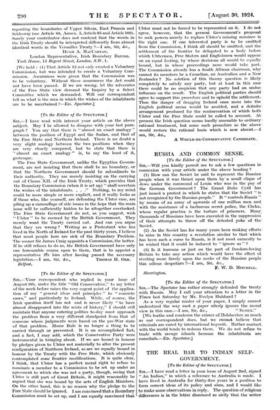[To the Editor of the SPECTATOR.] SIR,—Your correspondent who replied
in your issue of August 9th, under the title "Old Conservative," to my letter of the week before raises the very cogent point of the applica- tion of my "general ideas and principles" to "concrete cases," and particularly to Ireland. While, of course, the Irish question itself has not and is never likely "to have almost disappeared into the mists of history," I should still maintain that anyone entering politics to-day must approach the problem from a very different standpoint from that of someone whose judgments were based on the pre-War state of that problem. Home Rule is no longer a thing to be carried through or prevented. It is an accomplished fact, and a fact, I may add, which the Conservative Party were instrumental in bringing about. If we are bound in honour by pledges given to Ulster not materially to alter the present configuration of Northern Ireland, so are we equally bound in honour by the Treaty with the Free State, which obviously contemplated some frontier modifications. It is quite clear, I think, that Ulster has a perfect moral right to refuse to nominate a member to a Commission to be set up under an agreement to which she was not a party, though, seeing that Ulster is still part of Great Britain, it might reasonably be argued that she was bound by the acts of English Ministers. On the other hand, this is no reason why the pledge to the Free State should be ignored. I am eonvineed that a Boundary Commission must be set up, and I am equally convinced that Ulster must not be forced to be represented on it. I do not agree, however, that the present Government's proposal to seek powers merely to replace Ulster's missing nominee is the right one. If one interested party is to be omitted from the Commission, I think all should be omitted, and the settlement of the frontier be delegated to a body before which Ulstermen, Free Staters and Englishmen -would appear, on an equal footing, by whose decisions all would be equally bound, but in whose proceedings none would take part. • The Commission already has a South African chairman, 'why cannot its members be a Canadian, an Australian and a New Zealander ? No solution of this thorny question is likely completely to satisfy any party, but at least in this case there could be no suspicion that any party had an undue, influence on the result. The English political parties should' agree to support this procedure and to uphold the settlement. Thus the danger of dragging Ireland once more into the English political arena would be avoided, and a definite! arrangement produced for the contravention of which both' Ulster and the Free State could be called to account. At present the Irish question seems hardly amenable to ordinary I rational treatment, but some such procedure as the above would restore the rational basis which is now absent.-1. am, Sir, &c.,
A WOULD-BE-CONSERVATIVE CANDIDATE.


































 Previous page
Previous page